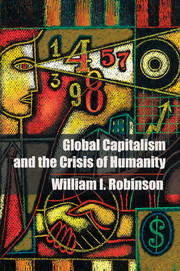2 - Notes on Transnational State Apparatuses
Published online by Cambridge University Press: 05 August 2014
Summary
The fundamental problem of the social science is to find the [historical] laws according to which any state of society produces the state which succeeds it and takes its place.
John Stuart MillAny understanding of the global crisis requires an inquiry into how the reproduction of global capitalism is possible – or indeed, if it is possible at all. An examination of the mechanisms of such reproduction involves analysis of the institutions in global society that make it possible, in actuality or in theory. How are the class relations of global capitalism institutionalized? What are the system’s institutional and political authority structures? How can we understand the political constitution of the dominant classes in global society – in particular, the TCC? How does the TCC organize itself in order to pursue its interests around the world?
Institutions are social interactions systematized – that is, institutionalized – by a system of norms and rules enforced by distinct coercive mechanisms, while structures organize sets or matrices of institutions. Hence social practices take place through institutions, and social groups and classes organize themselves through institutions; all but the most entirely coincidental social relations are institutionalized. One of the most important of these institutions is the state. Political institutions have secured economic reproduction ever since human beings moved beyond communal societies. The rise of the state in conjunction with the appearance of significant surpluses and the division of society into classes constitutes the central political instance in the development of class societies. There is therefore a historically constituted inner connection between state forms and production processes that we want to analyze with respect to capitalism and its transnational phase.
- Type
- Chapter
- Information
- Global Capitalism and the Crisis of Humanity , pp. 65 - 98Publisher: Cambridge University PressPrint publication year: 2014



